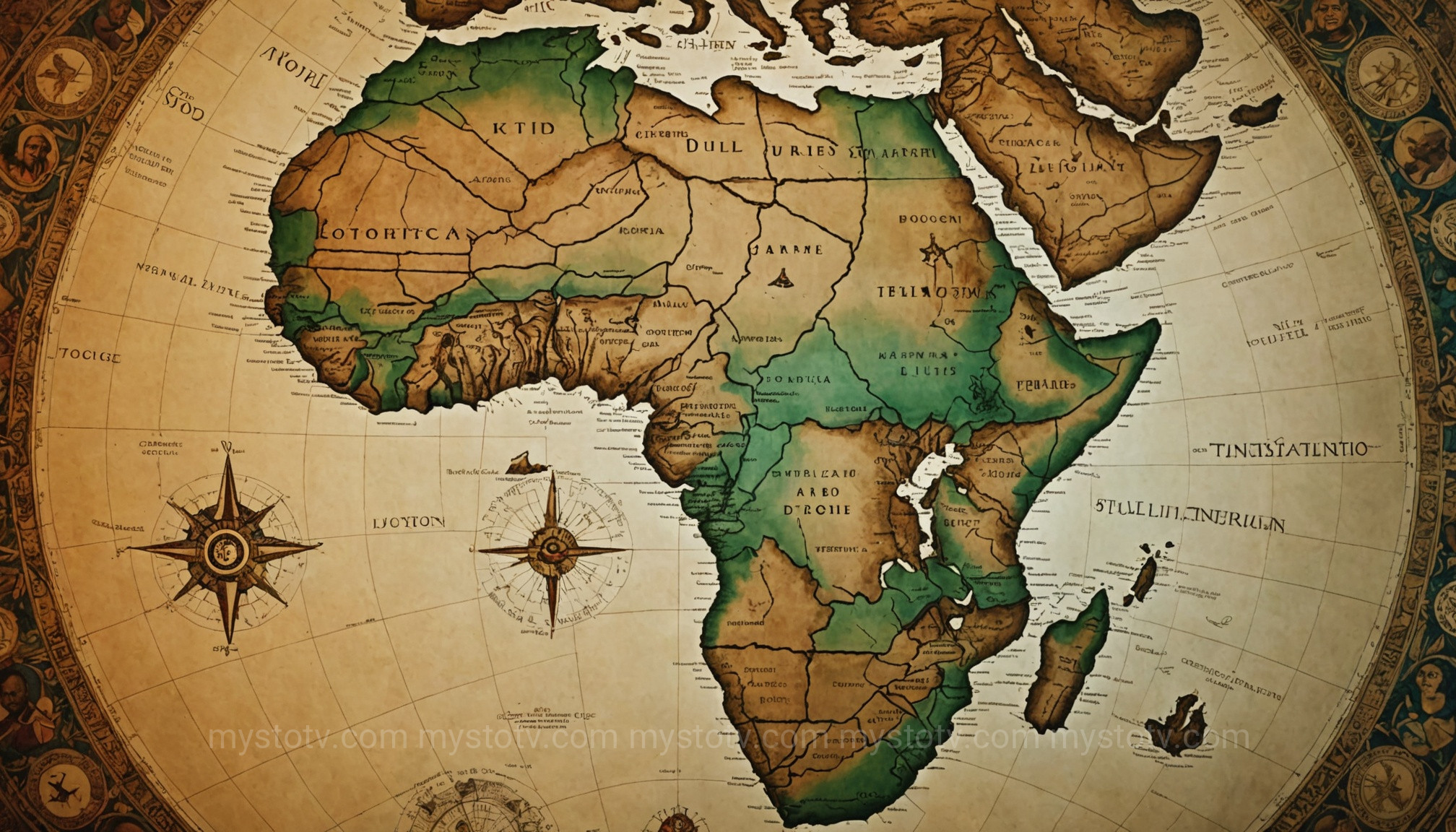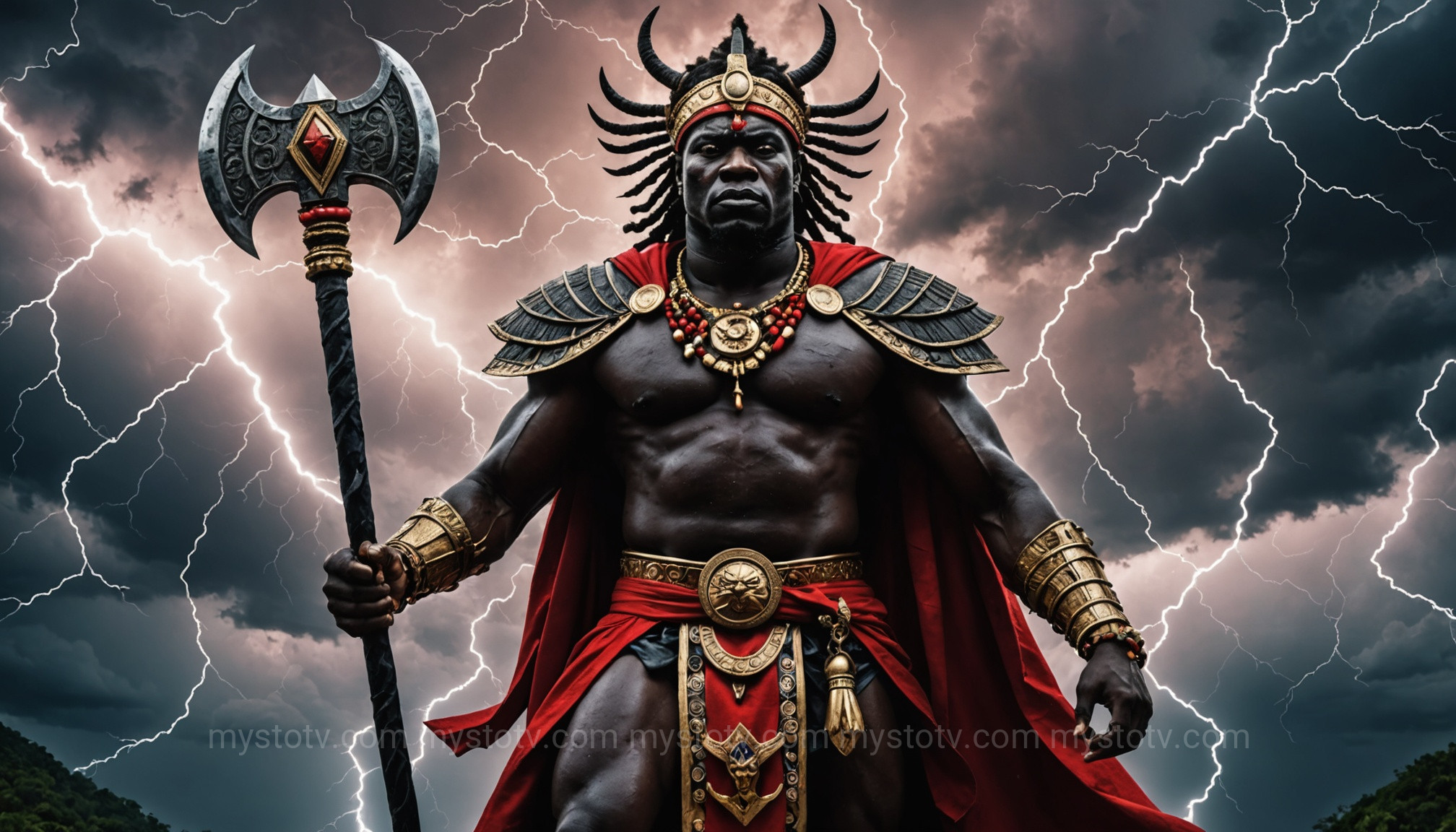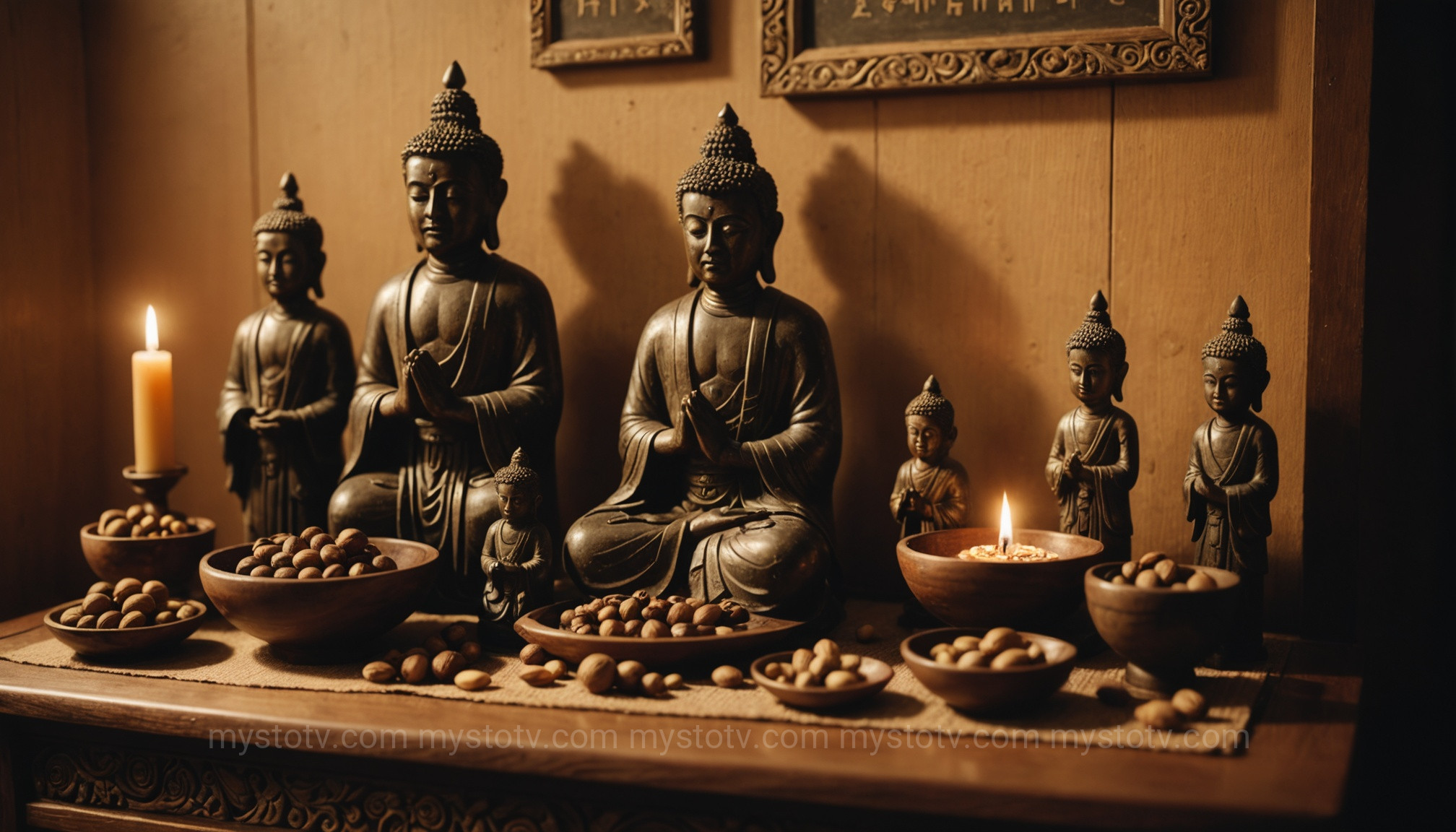Contents
- 1 Understanding the Diverse Pantheon of African Mythology Deities
- 2 The Role of Supreme Beings and Creator African Mythology Deities
- 3 Orishas, Abosom, and Other Intermediary African Mythology Deities
- 4 Ancestral Spirits and Nature Spirits Among African Mythology Deities
- 5 African Creation Myths and Their Connection to African Mythology Deities
- 6 Frequently Asked Questions
- 7 The Enduring Legacy of African Mythology Deities
- 8 References
Understanding the Diverse Pantheon of African Mythology Deities
 When we speak of "African mythology," it's crucial to acknowledge we are not talking about a single, monolithic religion. We are referring to a continent of over 54 countries and thousands of distinct cultures and ethnic groups, each with its own unique and complex belief system. However, across this incredible diversity, certain structural patterns emerge that help us understand the general framework of many traditional African spiritual beliefs. This framework typically involves a hierarchy of spiritual beings, a dynamic interplay between the divine and the human world that is both profound and practical.
When we speak of "African mythology," it's crucial to acknowledge we are not talking about a single, monolithic religion. We are referring to a continent of over 54 countries and thousands of distinct cultures and ethnic groups, each with its own unique and complex belief system. However, across this incredible diversity, certain structural patterns emerge that help us understand the general framework of many traditional African spiritual beliefs. This framework typically involves a hierarchy of spiritual beings, a dynamic interplay between the divine and the human world that is both profound and practical.
Most traditional African religions recognize a supreme creator god, a high being who is the ultimate source of all life and power. Below this often-distant creator are numerous other spiritual entities—lesser gods, nature spirits, and revered ancestors—who act as intermediaries. These are the figures who are most active in the daily lives of people, governing everything from the harvest and childbirth to justice and war. Understanding this structure is the first step in appreciating the complexity and richness of African mythology deities.
Analysis: The hierarchical yet interconnected structure of these pantheons is not accidental; it often mirrors the social and political organization of the cultures themselves. A supreme being, much like a respected elder or king, holds ultimate authority but delegates daily governance to chiefs, councils, and family heads (the intermediary deities and ancestral spirits). This worldview fosters a sense of cosmic order where everyone and everything has a specific role and purpose, from the highest god to the smallest river spirit, creating a holistic and integrated spiritual ecosystem.
The Role of Supreme Beings and Creator African Mythology Deities
At the apex of most traditional African pantheons sits a supreme being, a creator god responsible for setting the universe in motion. These deities are often seen as omnipotent and omniscient, but also transcendent, having withdrawn from the direct affairs of humanity after their work of creation was complete. This concept of a deus otiosus, or "idle god," is a recurring theme.
The Distant Creator in African Mythologies
In Yoruba cosmology, the supreme being is Olorun (or Olodumare), who resides in the heavens and orchestrates the cosmos without direct intervention. Similarly, the Igbo people of Nigeria venerate Chukwu as the all-powerful creator who exists beyond the grasp of human rituals. For the Kikuyu of Kenya, Ngai is the creator who dwells on the sacred Mount Kenya. While these African mythology deities are acknowledged as the ultimate source of everything, direct worship is often considered unnecessary or even impossible. Instead, prayers and sacrifices are directed toward the intermediaries who can carry messages to the high god.
Analysis: The distant nature of the supreme creator serves a vital theological purpose. It creates the spiritual space necessary for the existence and importance of the lesser deities and ancestors. If the supreme being were constantly intervening, there would be no need for the Orishas, Abosom, or other spirits. This structure makes religion a practical, daily engagement with accessible forces, rather than an abstract worship of a remote entity, grounding spirituality in the tangible realities of life.
Orishas, Abosom, and Other Intermediary African Mythology Deities
 The most vibrant and active figures in many African religions are the intermediary spirits and gods. These are the deities who walk with humanity, who preside over nature, embody human virtues and vices, and can be appealed to for help and guidance. They are the heart and soul of daily spiritual practice, and understanding them is key to grasping the essence of African mythology deities.
The most vibrant and active figures in many African religions are the intermediary spirits and gods. These are the deities who walk with humanity, who preside over nature, embody human virtues and vices, and can be appealed to for help and guidance. They are the heart and soul of daily spiritual practice, and understanding them is key to grasping the essence of African mythology deities.
The Orishas of the Yoruba People
Perhaps the most well-known group of intermediary deities are the Orishas of the Yoruba people (originating in modern-day Nigeria, Benin, and Togo). These are powerful, complex beings who were either primordial spirits present at creation or deified human ancestors. Each Orisha governs specific aspects of nature and human life.
- Shango: The fiery Orisha of thunder, lightning, justice, and virility. He is a former king of the Oyo Empire, known for his charisma and quick temper.
- Yemoja: A mother goddess, the Orisha of the ocean, nurturing, and creation. She is seen as the mother of many other Orishas and a protector of children.
- Ogun: The powerful Orisha of iron, war, labor, and technology. He is a path-maker, the spirit of civilization and invention, but also of conflict and destruction.
Worship of the Orishas has spread across the globe through the African diaspora, forming the basis of religions like Santería in Cuba and Candomblé in Brazil. You can learn more about creation stories connected to the Orishas in our later section.
The Abosom of the Akan People
Among the Akan people of Ghana and Ivory Coast, the intermediary spirits are known as the Abosom. They are the children of the supreme creator, Nyame, and act as his agents on Earth. Like the Orishas, the Abosom are connected to natural phenomena, such as rivers (like the spirit Tano) and the sea, and they receive prayers and offerings from worshippers seeking their favor and protection.
Analysis: The existence of these specialized, intermediary African mythology deities demonstrates a sophisticated understanding of the human condition. By assigning divine oversight to specific domains—technology (Ogun), justice (Shango), motherhood (Yemoja)—these systems provide a spiritual framework for all aspects of life. It shows a worldview where the sacred is not separate from the profane; rather, divinity is woven into the very fabric of work, family, and society.
Ancestral Spirits and Nature Spirits Among African Mythology Deities
Beyond the high gods and their powerful intermediaries, two other categories of spiritual beings are fundamental to most African traditional religions: ancestral spirits and the myriad spirits of the natural world. These entities form the most intimate and immediate layer of the spiritual world for many communities.
The Veneration of Ancestors
 Ancestors are not simply memories of the deceased; they are active, influential members of the family and community who exist in the spirit world. It is believed that individuals who lived a good, honorable life and are properly buried can become venerated ancestors (Egungun in Yoruba culture, for example). These spirits watch over their living descendants, offering guidance, protection, and blessings. They can also bring misfortune if they are forgotten or angered. This relationship ensures that tradition, ethics, and lineage remain central to community life.
Ancestors are not simply memories of the deceased; they are active, influential members of the family and community who exist in the spirit world. It is believed that individuals who lived a good, honorable life and are properly buried can become venerated ancestors (Egungun in Yoruba culture, for example). These spirits watch over their living descendants, offering guidance, protection, and blessings. They can also bring misfortune if they are forgotten or angered. This relationship ensures that tradition, ethics, and lineage remain central to community life.
Analysis: Ancestor veneration reinforces the deep cultural value placed on family, community, and continuity. It creates a powerful social contract between the living and the dead, where the living have a duty to honor their predecessors, and the ancestors have a duty to support their descendants. This belief system strengthens social cohesion and ensures the transmission of cultural values across generations.
Animism and Spirits of the Land
Animism, the belief that natural objects like rivers, mountains, trees, and rocks possess a spiritual essence, is a core component of many African worldviews. These nature spirits are often seen as localized African mythology deities who hold sway over their specific domain. A farmer might leave an offering for the spirit of the land before planting, or a community might honor the spirit of the river that provides them with water and fish. This belief fosters a deep-seated respect for the environment, viewing it not as a resource to be exploited, but as a living entity to be coexisted with.
African Creation Myths and Their Connection to African Mythology Deities
Creation myths are the foundational stories that explain the origins of the cosmos, the earth, and humanity. They are not just tales but philosophical and theological charters that establish the relationship between humans and the divine, particularly the African mythology deities responsible for creation.
The Yoruba Creation Story of Obatala
One of the most famous creation myths comes from the Yoruba people. The story tells that in the beginning, there was only the sky above, ruled by Olorun, and a watery chaos below. Olorun sent the Orisha Obatala down on a golden chain, equipped with a snail shell full of sand, a hen, and a chameleon. Obatala poured the sand onto the water, and the hen scratched at it, spreading it to form the landmasses of the world. The chameleon was sent to test the firmness of the new earth. Later, Obatala (or in some versions, Olorun) molded human beings from clay, breathing life into them.
The Dogon and the Cosmic Egg
The Dogon people of Mali have an exceptionally complex cosmology. Their creation myth begins with the supreme creator Amma, who created a cosmic egg. Within this egg were two sets of twin spirits called the Nommo. One twin, Ogo, grew impatient and broke out of the egg prematurely, creating a flawed and arid earth. To restore order, Amma sacrificed the other twin, Nommo, and scattered his parts across the universe, bringing order and moisture to the world. The Nommo were later resurrected and are considered the ancestors of humanity, teachers of civilization and spirituality.
Analysis: These creation myths do more than explain "how the world began." They are rich with symbolism that informs cultural values. The Yoruba myth establishes the roles and hierarchy of the Orishas. The Dogon myth, with its themes of twinness, sacrifice, and the restoration of balance, reflects a deep philosophical concern with order versus chaos and the duality inherent in existence. These stories provide a blueprint for understanding one's place in the universe and the nature of the African mythology deities themselves.
Frequently Asked Questions
Is there one single "African religion"?
No, this is a common misconception. Africa is home to thousands of unique ethnic and cultural groups, and many have their own distinct traditional religions, pantheons, and rituals. While some share common structural elements, like a supreme creator and intermediary spirits, calling it all one "African religion" is as inaccurate as calling Christianity, Judaism, and Islam a single "Middle Eastern religion."
Are these African mythology deities still worshipped today?
Absolutely. While Christianity and Islam are widespread on the continent, millions of people continue to practice their traditional religions. Furthermore, these belief systems are thriving globally in diasporic religions born from the transatlantic slave trade. Faiths like Santería (Cuba), Candomblé (Brazil), and Vodou (Haiti) are living traditions centered on the worship of African mythology deities, primarily the Yoruba Orishas and Fon Vodun.
What is the difference between a god (like an Orisha) and an ancestral spirit?
The main difference lies in their origin and scope of influence. Gods, like the Orishas or Abosom, are often primordial beings or deified historical figures who govern universal forces (e.g., thunder, the ocean, iron) and are worshipped by entire communities or nations. Ancestral spirits, on the other hand, are the souls of one's direct, deceased relatives who have achieved a venerated status. Their influence is generally focused on their own lineage, and they are honored primarily by their living family members.
The Enduring Legacy of African Mythology Deities
From the remote high gods who created the cosmos to the Orishas who govern human passions and the ancestral spirits who guide their descendants, the world of African mythology deities is one of breathtaking diversity and profound spiritual depth. These are not static relics of a forgotten past; they are living, breathing systems of thought that continue to provide meaning, ethical guidance, and cultural identity to millions of people both on the African continent and across the diaspora. To explore these pantheons is to uncover a rich tapestry of human spirituality, a testament to the myriad ways we seek to understand our place in the universe and our connection to the divine.
References
- Mark, Joshua J. Yoruba Religion. World History Encyclopedia, 2022.
- The Trustees of the University of Pennsylvania. African Religions and Expressive Culture. African Studies Center, University of Pennsylvania, N.d.
- Griaule, Marcel, and Germaine Dieterlen. The Pale Fox. Continuum Foundation, 1986. [Note: This is a foundational text on Dogon cosmology, referenced for the concepts described].